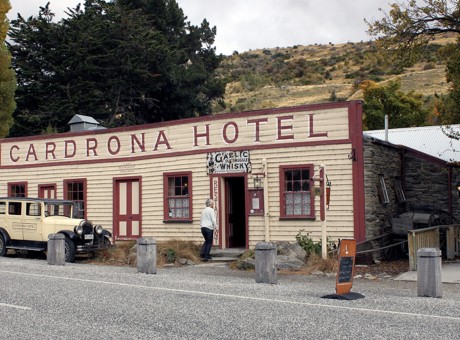Community leaders say government laws partly to blame for housing crisis

As the district scrambles to find solutions for those without a home, local councillors weigh in, with some saying central government law changes have exacerbated the problem.
The Residential Tenancies Act 1986, updated in 2020, was the first to be tweaked, removing six-month rent increases, rental bidding, and 90-day no-cause terminations.
However, Councillor Lisa Guy says the changes also removed some “agility” for landlords when renting out properties, leading to homes being taken out of the rental pool entirely.

Councillor Lisa Guy says there's less agility for landlords now when making individual property arrangements
When she came to the area in 1992, Councillor Guy lived in properties rented under individual arrangements made with homeowners, that may have included a requirement to vacate the property for a month over winter or summer, so it could be available for the owners own personal use. She also rented in homes with many other tenants.
She reckons the changes have also made more informal living arrangements like WWOOF (willing workers on organic farms) more difficult, and she's seeing less advertised.
She says the initiative was common pre-covid but has not recovered. It allowed people to share homes with those needing one, providing a room, all food, utilities, and inclusion as part of the whānau in exchange for three to four hours of housework, childcare or gardening.
Now there is limited, or no flexibility to do this under the new tenancies act, she says, and it’s not the only problem.
There are lots of empty homes in the district – 27 percent according to 2018 census data – with houses frequently sold to people living outside the district, and these houses decreasingly available as a longer term rentals.
“Council has no easy, legal means to incentivise landlords to offer these for long-term rental...Yet.”
She asks central government to make “long-term renting attractive again”, pointing also to the Healthy Homes Initiative.
Changes to the Healthy Homes Initiative came into effect in May 2022, requiring higher standards around heating, insulation, ventilation, moisture and drainage, and draught-stopping in rental properties.
“Central government have changed criteria for interest deductibility along with increases to the healthy home standards for landlords to meet. Many traditional holiday cabins, cribs like we rented when I first moved here in 1992 are no longer up to standard for long-term rental-occupancy.
“Ironic, because they can still be rented on Airbnb. People have had to move out of cabins as they don't meet the healthy home standard for long-term rentals”.
Councillor Esther Whitehead agrees that the healthy homes legislation requirements have seen some rental properties taken off the market, but doesn’t disagree with them entirely.
“In all fairness, those regulations are good, but the unintended consequence is that those house owners are better off to use their properties as visitor accommodation - this takes another house off the rental supply list.”
She says the rental squeeze is also being driven by the current housing market, the level of people's debt repayments, and the nature of property investment generally.
"As long as people can make money off property and effectively use it as a business then we will continue to have social issues.

Councillor Esther Whitehead says healthy homes are good - but there are unintended consequences.
"Central government has the ability to make changes that make it less desirable to buy properties which then shut out everyday home owners.”
Councillor Whitehead also pushed to restrict visitor accommodation in the new Ladies Mile development in October 2021.
“We will continue to have the same issues with new housing supplies unless we do this [set limits]."
The Ladies Mile masterplan has recently made headlines as Environment Minister David Parker has approved it for consideration under a streamlined planning process.
It’s set to bring 2,500 medium and high-density homes to outer Queenstown and Mayor Glyn Lewers says the building work could begin by the end of 2024, subject to planning processes.
Councillor Whitehead says she’s met with a number of people and listened to their problems, talking both with landlords and employers.
On the other hand, Upper Clutha Councillor Barry Bruce says he hasn’t received any direct approaches from people regarding the housing shortage, or the seasonal and transient working communities that he is connected with.
“This may be a reflection the issue is not as pronounced in Wānaka and the Upper Clutha.”
However, he agrees the present housing shortage - felt across New Zealand - has been “compounded by the effects of successive central government legislation and controls”.

The bright line test increasing to ten years is also a factor - Councillor Barry Bruce
As well as the previously mentioned interest deductibility, and healthy homes requirements, Councillor Bruce also believes the bright line test increasing to ten years has caused more problems.
Councillor Gavin Bartlett has expressed concerns surrounding the number of people unable to find a place to live, saying it is tat the “forefront” of councillors' minds.
Councillor Matt Wong’s statements share the same sentiment, saying in the past six months he’s had more conversations about housing than any other topic, and there's no quick fix he can see.
“Honestly, except going round in circles discussing barriers and potential solutions, I've not made a single tangible difference and it's extremely frustrating.
“Every real solution is met with large borrowing, high risk, potential rates impact, cross-industry and government collaboration, or housing legislation changes, none of which is an easy win. If there was an easy housing lever, it would have been pulled already.
Councillor Niki Gladding agrees that there's limited options for local government to address the housing shortage, but shared her efforts.
"QLDC has a couple of tools available via the Rating Act and District Plan but the solutions they might deliver are not certain, simple or inexpensive to implement. Ultimately, housing affordability is something that is squarely in the government's court to address via policy changes. QLDC should be shining a light on the problem and advocating strongly for those changes."
Councillor Gladding worked with Salvation Army and Joseph Mooney on their parliament petition to review of Accommodation Supplement zoning in Queenstown Lakes. The current zoning sees families missing out on $185 a week in these Work and Income payments, the petition currently sits before parliament.
She's been meeting with local MP Joseph Mooney about getting QLDC access to the data and enforcement capability of AirBnB and other visitor accomodation platforms, saying it would allow council to better manage residential VA and to collect the evidence needed to put more restrictive rules in place under the District Plan.
She's requested the same from Minister of Housing Megan Woods, in an email sent to her and other involved MP's, showing overseas examples from Europe, Vancouver and China where regulated data sharing appears to be the 'new normal' overseas.
Although Councillor Gladding's had no reply from Minister for Housing Megan Woods, the minister has confirmed a visit in Queenstown for April 18, when she has scheduled a talk about housing with Queenstown Business Chamber of Commerce members.

Every solution to housing is met with high risk and borrowing: Councillor Matt Wong.
All councillors were also asked if they were involved with Mayor Glyn Lewers' short-term solution.
The mayor recently told Crux the council was working together on a short-term solution, but could not supply any more details.
Although no councillor has confirmed their personal involvement, Councillor Guy says she is “keen to support any promising initiatives”.
Councillor Glading says councillors were isolated from the secret initiative.
"I have no idea what initiative the Mayor is referring to; councillors have asked for information about that initiative but have unfortunately been left out of the loop."
Councillor Whitehead has shared that the only short-term initiative she is aware of is the council engaging with the community and businesses in finding workforce and housing solutions together.
She cited an 'Adopt a worker' scheme as well as educating on the impacts of short-term (visitor) letting.
In an effort to secure workers a place to live, the district's seeing an increase in the amount of employer-supplied, staff housing.
Councillor Whitehead says she sees potential for long-term issues with this arrangement due to a “further imbalance of power”, while Councillor Guy expresses similar doubts about individuals living and working together.
In the midst of the housing shortage, Chamber of Commerce chief executive Sharon Fifield says the chamber has tried to determine what its role is, which is why they put on an information series about staff housing.
Many of the business owners she’s spoken to are navigating this space for the first time, and are confused as to how it alters employee contracts.
The first event was Tuesday, April 4, and had a large attendance, with more than 80 people showing up to hear speakers Kelvin Davidson, the chief economist from Core Logic, and Anita Vanstone, the Queenstown Lakes District Council’s strategic growth manager.
She’s notes not every business is in a state to buy housing stock - "they're big investments" - and she's observed it's mainly the bigger operators like NZSki and Skyline doing so.

Queenstown Chamber of Commerce's Sharon Fifield notes staff housing isn't always ideal.
“You've got to think that these businesses have kind of burned through a lot of the capital over the last few years.”
She agrees being an employer and landlord is “not necessarily an ideal position to be in”.
Her observations of the housing market mirror those of Councillors Whitehead, Guy, and Bruce, when it comes to ghost homes and new laws.
“What is probably most frustrating is the number of unoccupied homes and the fact that we don't have accommodation available for the purposes that we need.
“What we're hearing at the moment is the barrier that new tenancy legislation is placing on landlords. It’s making it less appealing to rent their house out long term.”
She says healthy homes is a good initiative, but it comes at a cost for homeowners. She disagrees that Airbnb and other peer-to-peer accommodations is the enemy in the housing situation because they enable people to stay in the district and help pay mortgages too.



























